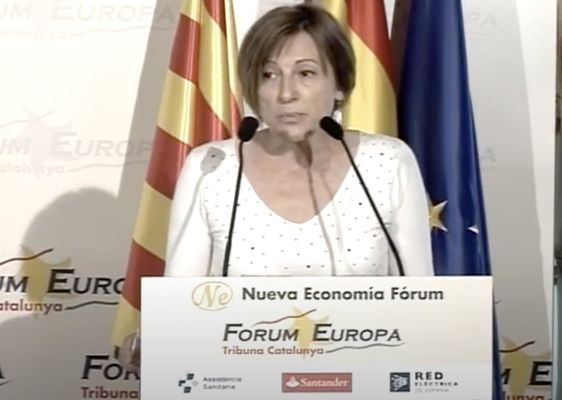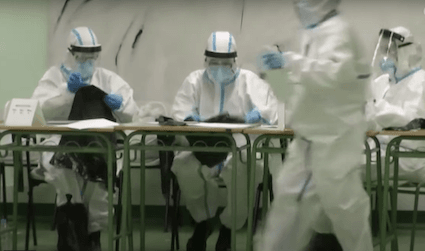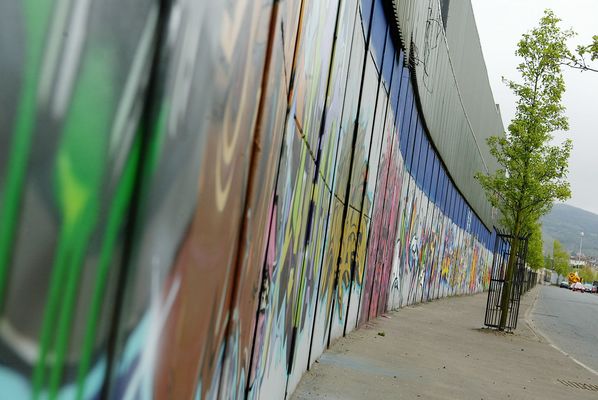St John’s Eve, 23rd June, in Catalonia is an ancient night of celebration. Once celebrated widely across rural Europe but now largely faded, the eve of the feast day still burns brightly in Catalonia. Literally so. Bonfires blaze, Catalans burn old things, eat Coca de Sant Joan, a traditional nutty cake, and of course drink cava, the national sparkling wine.
This year it was truly historic, lit up that afternoon by the release from Spanish jails of the Catalan political prisoners. When the Catalan government conducted a referendum on independence for Catalonia in 2017, and subsequently declared independence, the Madrid government responded ruthlessly, imprisoning Catalan elected representatives on charges of sedition.
The President of the Catalan Generalitat at the time, Carles Puigdemont, is currently in exile.
Sortim de la presó reivindicant els exiliats. President @KRLS, consellers @LluisPuigGordi, @toni_comin i @ClaraPonsati, companyes @martarovira i @AnnaGaSabate, no ens aturarem fins que sigueu a casa. Gràcies per les victòries amb què ens heu obsequiat des de l’Europa democràtica. pic.twitter.com/fhQwXSZeh7
— Josep Rull i Andreu 🎗 (@joseprull) June 23, 2021
The nine pro-independence Catalan leaders left prison wearing covid masks to be welcome by hundreds of supporters who greeted them with shouts of ‘Independencia’. In Mediterranean fashion, they embraced warmly and hugged each other. Together they carried the banner, Freedom for Catalonia, a slogan that dates back to the Olympic games in Barcelona in 1992. At that time support for independence was as low as 10 per cent but a new-found confidence led to a gradual rise in support.
Today that supports stands at around 50 per cent, having accelerated in recent years when the conservative Partido Popular was in power.
The pardons were issued by President Pedro Sanchez, the leader of the ruling Spanish socialist party. This was not, however, without controversy in the wider Spanish context. Sanchez defied disquiet within his own party. But the right-wind opposition parties tumbled over each other in their rush to denounce the releases.
This was taken on to the streets. The new ultra-right party, Vox, which emerged on the back of anti-immigrant sentiment, organised a major demonstration in the centre of Madrid. Speaker after speaker used the occasion to attack the socialist party, and Sanchez in particular.
According to El Pais, up to 60,000 attended the rally.
One of the first statements of the released prisoners was to demand an amnesty for other victims of political repression. The Catalan agency, Òmnium Cultural, reports that since September 2017, 1396 people have been injured and 292 detained by the Spanish police for pro-independence activity.
RETURN OF EXILED MINISTERS
The former ministers among the released prisoners said they will now campaign for the return of the ministers who are currently in exile, including Catalan former president Carles Puigdemont. They reiterated their commitment to achieving a Catalan Republic. As Spain has a monarch as the head of state, King Felipe VI, the Catalan campaign has republican as well as independence objectives.
"REPRESSION HAS NOT DEFEATED US": Protesting for independence in Catalonia. Pic by Külli Kiitus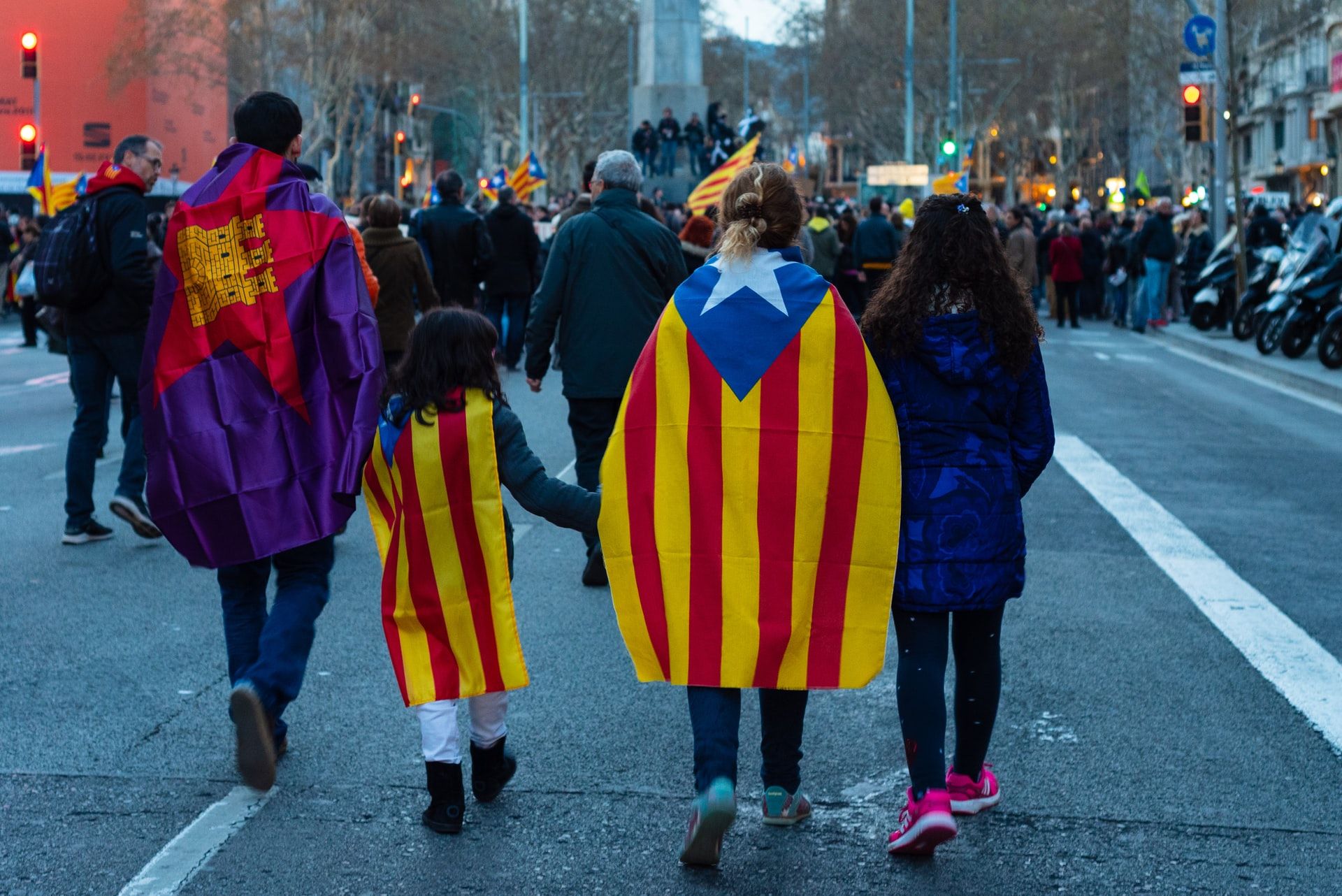
Former minister Josep Rull said defiantly that the only ones who have to ask for forgiveness are those who "beat the voters of the 2017 referendum", referring to the actions of the Spanish police. Another prisoner, Jordi Turull, described the Supreme Court which sentenced them to years in jail as the "Guantanamo of justice". The watchword from the former prisoners was: "Repression has not defeated us”.
The current president of the devolved government in Catalonia, Pere Aragones, welcomed the prisoners home and expressed the hope that Catalonia will never have political prisoners again. He looked forward to a "democratic solution” to the political conflict. He is due to meet President Pedro Sánchez in Madrid in the coming days.
It is not clear why these leading politician-prisoners have been released at this particular time, though some movement seemed inevitable. For one thing the coming to power of a socialist party in Spain has helped. In addition, over the last three years, international pressure has been mounting. The Council of Europe has officially called on Spain to release Catalonia’s political prisoners and withdraw the extradition requests for their exiled colleagues.
COMPARISON WITH TURKEY HURT MADRID
The parliamentary assembly of the European Union highlighted a report by its Committee on Legal Affairs on the plight of political leaders in prison in Spain and Turkey. The comparison hurt.
"GUANTANAMO OF JUSTICE": Joyful scenes as former ministers are released from jail.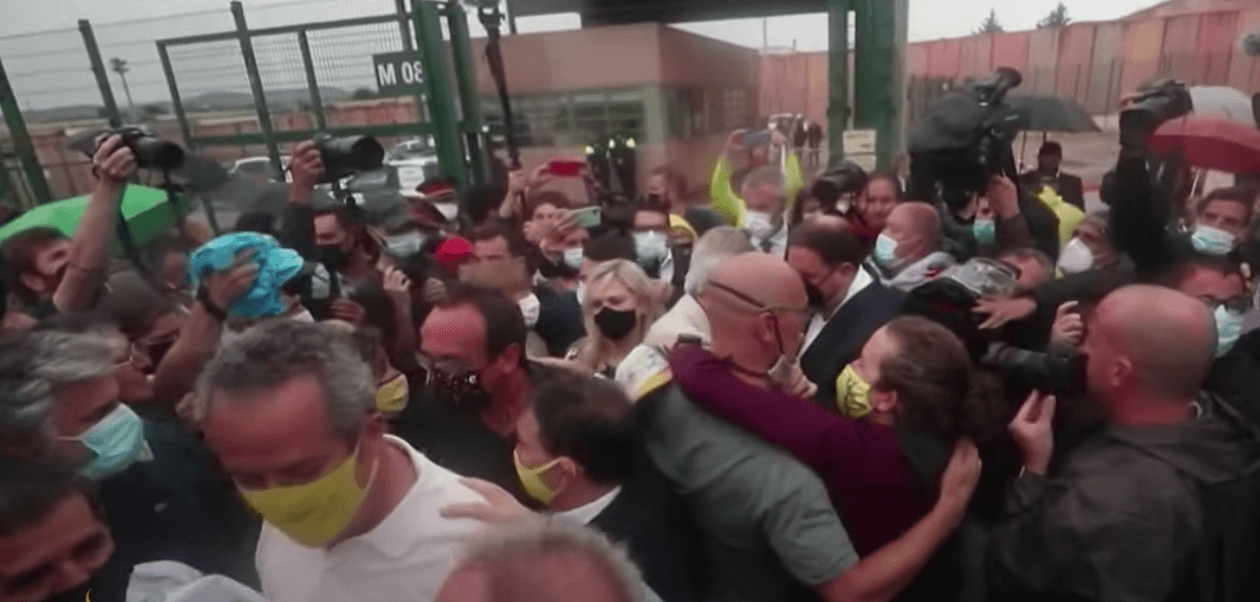
There have been initiatives from civil society as well. Earlier this year, fifty international figures signed a manifesto entitled 'Dialogue for Catalonia. "The undersigned urge the Spanish government and its Catalan counterparts to enter into unconditional dialogue in order to find a political solution enabling the citizens of Catalonia to decide their political future.”
This was published in the Washington Post and the Guardian, and the signatories included Mairead Corrigan, Gerry Adams, former Brazilian president Dilma Rousseff, Yoko Ono and exiled Chinese artist and activist, Ai Weiwei. Five Nobel laureates were on the list.
🌍 50 world-renowned personalities have signed #DialogueForCatalonia, an international manifesto calling to put an end to repression, for an #AmnestyNow for those prosecuted, and for the right of Catalans to decide their future.
— Òmnium Civil Rights Europe (@OmniumIntl) January 4, 2021
✍️ Sign it too at https://t.co/wGqTqI4unM pic.twitter.com/v95lkBG9iI
The crisis is far from over. Last month, Spain's public auditing body announced it was investigating the Catalan government's spending on foreign policy between 2011 and 2017.
This forms part of its on-going investigation of public spending related to Catalonia's independence drive. The Spanish administrative body has the power to hold individuals responsible for public-spending decisions and impose million Euro fines where it deems the funds were used inappropriately. So far, more than thirty people, including former Catalan presidents Artur Mas and Carles Puigdemont, former vice president Oriol Junqueras, and several other ex-ministers have been summonsed.
The bonfires of St John’s Eve have now died out. The same cannot be said of the smouldering political fires ranging across Catalonia.
Irene Boada Montagut is the author of Women Write Back: Contemporary Irish and Catalan Short Stories in Colonial Context (Irish Academic Press).



